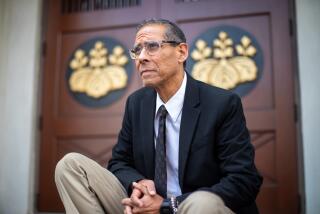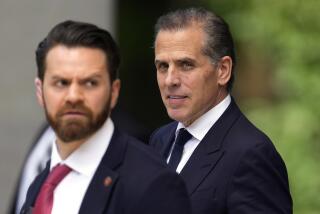Steroid Inquiry Involves Hunter
- Share via
Marion Jones’ ex-husband, C.J. Hunter, has been in contact with U.S. anti-doping authorities and will probably cooperate with their investigation into whether Jones has used steroids, his attorney said Friday.
Hunter, a shotputter who retired after testing positive for steroids in 2000, also has been assisting federal prosecutors in a separate federal case in San Francisco.
Attorney Angela DeMent would not describe what Hunter has told federal officials.
The U.S. Anti-Doping Agency, in pursuing its parallel investigation, has been keenly interested in hearing what he might know about the circumstantial evidence it has pointing to Jones.
That includes a canceled check and a calendar that allegedly lays out a doping schedule for the five-time Olympic medalist.
Jones has repeatedly denied using steroids, and her attorney has called the evidence weak.
Asked if Hunter plans to assist USADA, DeMent said: “Chances are much more likely that we will than we won’t.”
The ever-widening scandal has seen USADA racing to ensure that the U.S. sends a clean team to the Olympic Games in Athens this summer. The agency has already persuaded one top sprinter to accept a two-year ban and has notified four others -- including Jones’ current partner, Tim Montgomery -- of potential doping violations.
But as her sport’s brightest star, Jones remains the most-prominent track and field athlete to come under scrutiny by the agency.
Much is at stake. USADA, founded to oversee drug testing for U.S. Olympic athletes only a few years ago, is trying to establish itself as an effective policing organization.
Jones is fighting for her professional life, not to mention millions of dollars in endorsements, and has threatened to sue if USADA attempts to ban her from the Olympics.
She recently met with agency officials to answer questions about the evidence against her. Friday’s development suggests the investigation might be inching even closer to her doorstep.
The matter stems from the criminal case involving the Bay Area Laboratory Co-Operative, or BALCO, where four men stand charged with distributing steroids to professional baseball and football players and Olympic athletes.
Jones was called to testify before a grand jury in that case last fall. She has said she had only a passing connection to the company.
On Friday, her lawyer announced that she has asked prosecutors to release her sealed grand jury transcripts to USADA.
“The sworn testimony will confirm what Marion has said publicly time after time ... she has never, ever used performance-enhancing drugs,” attorney Joseph Burton said in a statement. “In taking the extraordinary step of asking for the release of this material, Marion is continuing to do all she can to cooperate.”
The still uncertain relationship between Jones, Hunter and BALCO dates at least to 2000, when Hunter tested positive shortly before the Olympic Games.
BALCO founder Victor Conte, promoting a line of nutritional products, stood beside the shotputter at a news conference in Sydney and blamed the test results on iron supplements Hunter had been taking.
Later, one of BALCO’s websites boasted that Jones had adopted the company’s nutritional regimen. The article was accompanied by a photograph of Conte arm in arm with Jones and Hunter.
The couple separated in June 2001 and eventually divorced.
Last September, federal agents raided the BALCO office in Burlingame, Calif., and found, among other evidence, a $7,350 check written to BALCO in 2000 from Jones’ bank account.
Jones’ attorney has said that the check was signed by Hunter and that she had no knowledge of the payment.
After the raid and grand jury investigation, Conte was indicted along with BALCO vice president James Valente and two associates: track coach Remi Korchemny and personal trainer Greg Anderson, who worked with Barry Bonds.
All four defendants have pleaded not guilty.
Although some of the BALCO evidence has remained sealed, much of it was subpoenaed by a Senate committee in April and handed over to USADA.
Armed with this information, the agency persuaded sprinter Kelli White to accept a two-year ban.
Last week, USADA notified the four other sprinters -- Montgomery, Chryste Gaines, Michelle Collins and Alvin Harrison -- of potential violations.
Attorneys for Montgomery, Gaines and Collins have said they will fight any attempt to ban their clients from the Olympics. Harrison’s attorney could not be reached for comment.
USADA’s campaign has been controversial because of the nature of the circumstantial evidence from the BALCO case, which includes e-mails and the calendars that investigators allege showed athletes when to take performance-enhancing drugs such as a designer steroid called THG and human growth hormone.
The calendars are partially coded and at times inconsistent.
The agency has been seeking the help of witnesses who might testify to sort out any confusion.
Conte has met with federal prosecutors in hopes of securing a plea bargain that would allow him to help USADA with its investigation.
Hunter might also be in position to bolster the agency’s efforts by giving further information about the check and other evidence. So far, the agency has spoken to him through his attorneys.
As for the federal case, it was unclear if Hunter has agreed to talk because he was a target.
Asked if he had cut a deal with prosecutors, DeMent replied: “I’m not sure that’s totally accurate.” She added that he has cooperated fully, if “in a somewhat compelled fashion.”
More to Read
Go beyond the scoreboard
Get the latest on L.A.'s teams in the daily Sports Report newsletter.
You may occasionally receive promotional content from the Los Angeles Times.







